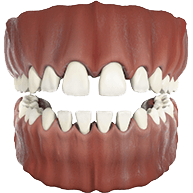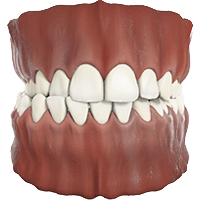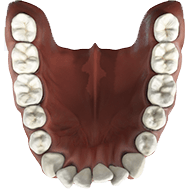Losing teeth is a common issue nowadays due to high sugar consumption, smoking, and unhealthy lifestyles. Even if a single tooth is lost, it can affect your smile, chewing, and the health of neighboring teeth. Improper chewing may even lead to gastrointestinal problems.
Dental implants have become the golden ticket for replacing missing teeth. The UK dental implants market size was estimated at 114.81 million in 2023 and is expected to grow by 9.9% from 2024 to 2030. The following blog provides an overview of dental implants and their various types.
What is a dental implant?
Dental implants are titanium screws embedded inside your jawbone. The objective is to replace the extracted tooth’s root with a titanium implant to improve retention and functionality for the final restoration.
They provide the following benefits: better functionality than traditional bridges or dentures, lasting a lifetime, higher aesthetic results, stimulation of the jawbone to prevent bone loss, and do not require the reduction of neighboring teeth as in traditional bridges.
However, some people refrain from choosing dental implants because of their fear of the surgical procedure and the high cost.
The basic types of dental implants include:
Endosteal implants: This is the most commonly used type of dental implant, where the implants are embedded inside the jaw bone.
Sub-periosteal implants: uncommon type of dental implants. The implant is placed above the bone and below the gingival tissue. It is used in cases of complete edentulism where there is no sufficient bone to place an endosteal implant, and the patient refuses an additional surgery of bone augmentation.
Zygomatic implant: is the least commonly used type of implant. The implant is loaded inside the zygomatic bone or the cheekbone. It is recommended only when there is a severe deficiency in the maxillary bone, making it impossible to support the regular endosteal implants.
Dental implant components
Dental implants comprise three main parts: implant fixture, abutment, and the final restoration.
An implant fixture is a titanium screw that is inserted inside the jaw bone to replace the tooth root. It is available in different diameters and lengths to help the dental professional through a wide variety of selections according to the case.
The implant abutment is the middle part connecting the implant fixture fused with the jaw bone to the final restoration. It is available in different shapes according to the type of the final restoration. In the case of a denture-retained implant, it may contain a rod to fit in the lower surface of the denture, and in the case of an implant-retained bridge, it may contain a screw to attach the bridge.
The final restoration is the part visible inside the mouth that accomplishes the masticatory and esthetic function. It resembles the crown of the natural tooth. The artificial teeth are most commonly made of ceramic. It may be in the form of a single crown, bridge, or complete denture.
Types of dental implants
Every case is different. The selection between the various types of implants depends on the number of missing teeth, bone condition, patient expectations, and financial condition.
The different types of dental implants include:
Single implants
Single implants involve restoring every missing tooth with an individual implant and are called a one-for-one basis. The implant is placed inside the bone at the site of the missing tooth to replace the root, then topped with a single crown. In contrast to the conventional bridges used to restore a single missing tooth, they provide a more natural appearance, no reduction of the neighboring teeth, stimulate the jaw bone, and prevent its resorption.
All-on-four implants
All-on-four implants are a valid option if you have a complete edentulous ridge. During the treatment planning, the plan is set to secure four implants distributed at specific sites and distances from each other to support the full-arch restoration. It is much cheaper than replacing every missing tooth with an implant. A temporary restoration is loaded on the same day and will be replaced by the final restoration within six months. A soft diet regime is recommended following the temporary restoration loading until complete healing occurs.
All on six implants
All-on-six implants is very similar to all-on-four implants; the difference is that six implants are used instead of four. It provides a better force distribution and retention of the final restoration. The main disadvantage is that it is more expensive when compared to the all-on-four implants.
Implant retained bridge
When multiple adjacent teeth are missing, the implant-retained bridge is a successful alternative to the conventional bridge. One implant is placed at either end of the edentulous area. After complete healing, the final restoration is a bridge attached to the implant abutment. Implant-retained implants conserve the tooth structure as no reduction of the adjacent teeth is required a s in the conventional bridge.
Denture retained implants
Denture-retained implants are when the final restoration of the implant is a conventional removable denture and not a fixed restoration. The implant abutments are connected with rods that fit into grooves on the lower surface of the denture, which provides high retention to the denture and prevents its dislodgment during eating or speaking.
Same day implants
Generally, after implant placement, the gingiva over the implant is stitched, and the implant is left unloaded for 4-6 months until complete healing and osseointegration around the implant. In some cases, where there are favorable conditions of bone density, bone quantity, and initial implant retention, a temporary restoration is loaded on the same day of implant placement and is called a same-day implant.
Dental implants have become the first line of treatment for missing teeth. Dental implant treatment planning is a sophisticated process. Deciding the most suitable implant type, size, number, final restoration, and loading time for the final restoration is a multifactorial decision.
At the Dental Care Center, we are world-leaders in Dental Implants, with patients coming from all across the UK. You can book online 24/7 by clicking here or call 0207 639 3323.













